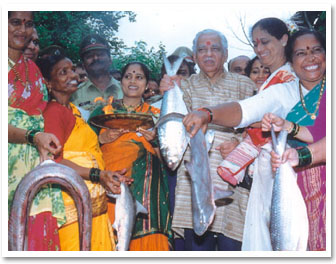Fishermen of Mumbai and adjoining coastal lines look to Ram Naik as their friend and guide. His close association with them began in 1978 when he first became MLA from Borivli which includes Gorai - Manori villages beyond the creek. Fishing and farming are their main occupations. Later after becoming M.P. in 1989 his activities extended to coastal areas of Vasai and Palghar Talukas in Thane District.
As an MP, Ram Naik strongly fought against licensing to foreign trawlers for coastal fishing. He raised the issue in the Lok Sabha and mobilized the support of M.P.s from the coastal states as a result of which the Government of India appointed the K. Muraree Committee on 27th July 1995. Ram Naik was also nominated as a member. He made valuable contribution in the committee work. |
|
 |
As an outcome, foreign trawlers were banned in coastal areas which proved to be a boon to the fishermen.
When Ram Naik became the Petroleum Minister he used his office for the cause of
fisher folks. He visited the Mumbai High oil fields for the first time and saw huge
pipelines more than 200 km long carrying oil under the sea which gave him an idea
of how to provide drinking water to Manori - Gorai beyond the creek. The
population of nearly 15,000 was not getting piped drinking water as it was not
'economical' for Mumbai Municipal Corporation to provide them water. Ram Naik
encouraged Indian Oil Corporation to undertake a project to lay under water pipe
lines with only 2 km length as a commitment to the social welfare. The project of
Rs.4 crore was inaugurated on 4th March 2001. People of Manori - Gorai
particularly women were overwhelmed as no longer they had to fetch drinking water
from wells outside the villages. They started getting drinking water at their homes.
The houses of fishermen of Arnala Fort which is an Island in Vasai Taluka, District
Thane literally lighted up because of Ram Naik. Like Mumbai Municipal
Corporation, the State Electricity Board was also finding it 'economically' difficult to
lay electric cables across the sea for providing electricity to the village having
population of nearly 600 families only. Evenafter 50 years of independence they
were living in darkness. A ray of dawn was Ram Naik himself! He urged upon the
Oil & Natural Gas Corporation (ONGC) to take up the challenge and use their
techniques, resources and money for this social cause. Accordingly ONGC did the
project by spending Rs. 1.75 crore. Finally the electricity reached Arnala Island Fort
on 18th March 2001.
Satpati in Palghar Taluka is a famous fishing harbour known for delicious pomfret.
During the monsoon of 1999 and 2001, high tides alongwith heavy winds badly
eroded the sea shore and several houses were washed away. In order to avoid
recurrence, survey, investigation and design of the bund wall were carried out by the
Maharashtra Engineering Research Institute. The estimated expenditure was Rs.2.85
crore. The Maharashtra Government expressed their inability to undertake the work due to financial constraints. Finally Ram Naik came to the rescue and requested the
Bharat Petroleum Corporation Ltd. to sanction the expenditure of Rs.2.85 crore from
their welfare fund. The construction of anti-sea erosion bund wall with 1,390 metre
length was completed. The inauguration function was held on 9th February 2003. It
has given a big relief to fishermen of Satpati.
After entering the Lok Sabha for the first time in 1989, Ram Naik raised the issue of
giving excise duty rebate to fishermen who were using diesel for their boats. The
reason was that foreign fishing trawlers who were coming to Indian coast, used to
get diesel without excise duty as it was treated as export of diesel. Due to this
concession to foreign trawlers, Indian fishermen were facing difficulties to compete
with them as diesel forms an important cost item. Ram Naik therefore demanded
during budget discussion that Indian fishermen should also get rebate on excise duty.
Prof. Madhu Dandavate was the Finance Minister and as he was also representing
from the Konkan coastal area, he conceded the demand and announced a rebate of
35 paise per litre. Though diesel prices increased subsequently, the rebate of excise
duty was not increased. However when Ram Naik became the Petroleum Minister,
he reviewed the position and increased the rebate to Rs.1.50 per litre in the year
2003. After Dr. Manmohan Singh took the reigns in May 2004, the diesel prices
have been continuously increasing. However the Government have not increased
the rebate rate. Ram Naik together with fishermen continues to fight for this
demand. No wonder that fishermen respect him as their friend and guide.
|